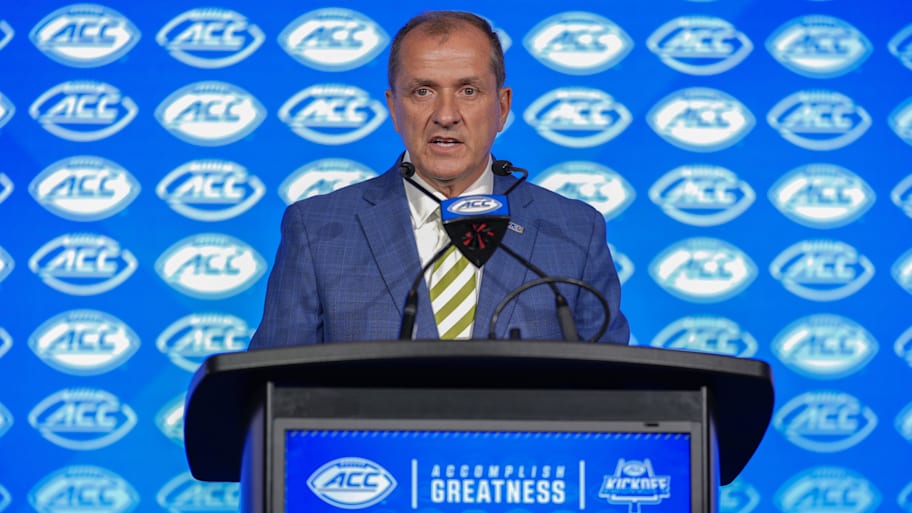CHARLOTTE — The College Football Playoff is stuck between a rock and a hard place.
On one side is the rock, the debate surrounding automatic bids to the playoff weighing down the future of the postseason.
Then there’s the hard place.
That’s where the CFP selection committee, which has suddenly—and needlessly—found itself taking slings and arrows this month, lives. Nobody is yet directly calling into question the performance of said committee outside of a few veiled messages, but they certainly are questioning its existence a lot more than at any point since the playoff first came about.
On Tuesday at ACC kickoff, the latest entrant into this category was SMU coach Rhett Lashlee, who should have been extolling the virtues of the work the committee did last year by including his Mustangs in the field.
If anybody should be cheerleading for the committee, it’s the league that Lashlee is a part of and he should be head of the pack.
In reality, he’s actually at the back of the line.
“The committee has a really hard decision. We were up close and personal with that a year ago, and I respect what they have to do, but honestly it’s a situation that’s set up for failure because there’s human bias and there’s always going to be,” Lashlee said. “I think, if we could remove the committee from the situation, it would help because there’s no other major professional sport or major sport in America or the world that uses a committee to select their tournament participants.”
SMU was the last team in the 2024 playoff as an at-large—one spot ahead of Alabama, two spots ahead of conference brethren Miami and six in front of Clemson, which the Mustangs lost the ACC title to at the last second. If any team benefited from having a committee, it was most certainly the Mustangs.
And for whatever accusations of bias are lobbed around such work, it should be noted that the SEC representative on the committee was Arkansas athletic director Hunter Yurachek, who had to step outside the room for debates about the Ponies because his son works in SMU’s athletic department.
Lashlee was not immune to using his bully pulpit to poke at the SEC when it came to the playoff.
“I’ve been in the [ACC] before and been in the SEC,” said Lashlee, who was previously an offensive coordinator at Miami and Auburn. There’s other leagues that claim depth, but I mean the SEC’s had the same six schools win the championship since 1964. Same six, not a single one has been different since 1964. It’s top heavy to me, that’s not depth.”
It’s also exactly what the committee is for. There are only so many crossover data points that truly give a concrete idea of a team from one league being better than another from a different conference.
Last year they determined the freshly minted ACC team was better than a team that won some notable SEC games, but also dropped the ball against mediocre teams, like Oklahoma.
Instead of parroting that fact, Lashlee promoted a new wrinkle on the expanded 16-team playoff proposal that included four automatic bids for the Big Ten and SEC (as the former has proposed) and four more for the ACC and/or Notre Dame. The Big 12 would get three spots and a Group of 5 team the final one.
“Let’s earn it on the field. How do we do that?” Lashlee said. “We start talking about automatic qualifiers and I hear this league and this league should get four. We shouldn’t get two and the Big 12 get two because we almost double their revenue. They haven’t won a national title, with a school that’s currently in that league, since 1990. We’ve won just as many national titles in the last 15 years as the Big Ten. It’s hard to start giving automatic qualifiers on projecting the future based on the past.”
So don’t! Stop advocating for it, which is what you’re doing by trying to make auto bids a thing by painting it as earning it on the field. SEC coaches have even come around to the idea.

Subjectivity is a selling point in college football. Too many like Lashlee treat it like a bug.
“It’s totally different football and it’s a totally different life,” said Cal quarterback and former Ohio State player Devin Brown. “Big Ten football compared to ACC football is night and day different in terms of the people and the staff and life outside of football with the fans and stuff like that.”
“I mean, the SEC schools, those fan bases are insane,” said Miami quarterback Carson Beck, who transferred from Georgia. “But football is football, right? Offense is offense, so everybody runs the same stuff, it’s just different words. It’s different lingo, different scheme.”
It sure helps to have a committee to navigate those subtle differences no matter how big the field is for 2026, eh?
The ACC is not exactly throwing its weight behind what Lashlee pitched Tuesday, aligning more closely with the Big 12’s stance that if there is playoff expansion in the near future, it should not come with strings attached in the form of set spots for the Power 4.
“We have a really good playoff right now in five [automatic qualifiers and] seven [at-larges], and I’ve been pretty direct about the idea that we want access and fairness,” ACC commissioner Jim Phillips says, while expressing openness for nine at-large spots in a 14-team playoff and 11 in a 16-teamer. “The AQ model is something that our membership is not interested in.”
Not interested and not the kind of thing the ACC should ever consider.
They need a committee probably more than any of their peers because it takes some discernment to properly evaluate a conference that spans coast to coast and plays eight conference games while shoehorning in Notre Dame and a few SEC rivalries.
It’s also notably seeing many of its programs trying to take that next step on the field. SMU has invested heavily and will likely be back in the Top 25 after nearly winning the league in 2024. Clemson is back to being a national title contender. North Carolina didn’t just hire a coach, it hired Bill Belichick.
Even Florida State, which can gripe about the committee as much as anybody given what transpired with its undefeated team in 2023, is picking the pieces up and becoming optimistic about the future both in Tallahassee and with the league it recently sued.
Momentum, if there’s such a thing for a conference, seems to be pointed in the right direction.
“We got here in 2022 and I remember watching film and saying we’ve got a lot of work to do,” Hurricanes coach Mario Cristobal said. “Miami was on the verge of not having a player drafted for the first time in I don’t know how many decades, and then finally late in the seventh round, a player was selected. To me, Miami did not have the talent and Miami did not recruit to the level that Miami is supposed to recruit.
“Now you fast forward three years later, Miami is coming off a 10-win season. Now Miami is sixth in the country in players drafted with double-digit combine invites, with double-digit wins, and with the No. 1 pick overall. The steady progress and trajectory is a product of a lot of people, players, coaches, staff members working really hard to get Miami to where it needs to be.”
That is where Lashlee took SMU last season—the playoff. Cristobal was on the wrong side of the line, and all but acknowledged the committee got it right. He cited his defense that underperformed a year ago and cost them to the point where major changes happened this offseason in an attempt to take any future decision out of the committee’s hands.
On the field, that is, and not by making the sport even more esoteric by further complicating the postseason process.
“We all recognize the importance of coming together to find a solution that is truly best for all of college football,” Phillips says. “Fairness and access are paramount, just as they are in all other college sports postseasons.”
Another key factor in those college sports? Committees doing their always difficult job of picking the field.
Only in that same enterprise does it make sense to start questioning that, but perhaps it’s no surprise the same entity finds itself trying to constantly navigate out of a tricky spot between a rock and a hard place.
More College Football on Sports Illustrated
This article was originally published on www.si.com as Instead of Hammering CFP Selection Committee, SMU Should Celebrate Its Decisions.
